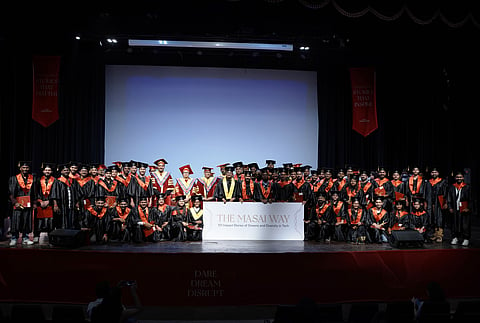Masai School and its social impact
Masai’s story isn’t just about education; it’s also about social impact. Can you share how Masai has helped uplift over 350 families above the poverty line, and what kind of long-term impact this has had?
At Masai School, we believe that education is the most powerful tool for breaking the cycle of poverty. By providing young individuals with skills in high-demand sectors like tech and data, we have not only helped our students secure jobs but also empowered their families.
To date, over 350 families have been uplifted above the poverty line through the success of Masai graduates.
When our students find well-paying jobs, it has a ripple effect on their families. Their income supports their parents, siblings, and extended family, improving their access to healthcare, education, and quality living standards.
This creates a sustainable long-term impact, where the benefits of education continue to transform lives for generations. It also contributes to economic growth in communities that were previously underserved, thus creating a more equitable society in the long run.
Your institution has successfully broken barriers for women in conservative environments, particularly in tech fields. What challenges have you faced in empowering women through Masai, and how have you overcome them?
Empowering women in conservative environments, especially in tech fields, has been one of our proudest achievements at Masai. However, it hasn’t come without its challenges.
Many of our women students come from traditional, patriarchal backgrounds where access to education, especially in fields like technology, is limited. Overcoming these cultural and societal norms required us to first build trust within the communities. We had to demonstrate that tech was not just for men but for women as well and that women could excel in these fields with the right opportunities.
We also faced challenges around family expectations, where women were often expected to prioritise domestic duties over career ambitions. To address these, we provided strong mentorship, flexible learning schedules, and a supportive environment where women could balance their studies with their responsibilities. Furthermore, by showcasing female role models from the tech industry and sharing success stories, we have been able to inspire many young women to pursue careers in tech.
Over time, these efforts have helped us break down barriers, and now we see a growing number of women succeeding in tech roles, challenging stereotypes, and paving the way for future generations.
Masai has had a remarkable journey in a short time. What advice would you give to students who are struggling to find the right opportunities and feel stuck in their current situations?
Identify the skills that are in demand. Students should understand that it is not just about theory these days, practical skills play a vital role. Employers are interested in seeing evidence of your skills. It is ideal for students to start small projects, contribute to open-source work, or freelance. Recruiters value practical experience highly. Opt for internships, contract work, or even volunteer projects to gain exposure.
If you’re learning to code, practice through coding challenges, hackathons, or by contributing to community projects. The experience you gain will add credibility and enhance your employability.


